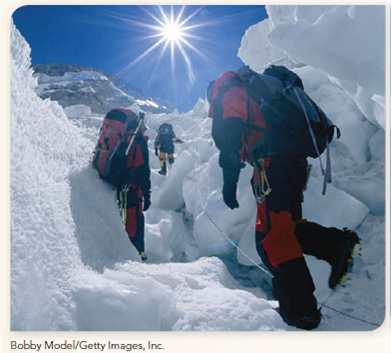
Management 13th Edition by John Schermerhorn,Daniel Bachrach
Edition 13ISBN: 978-1118841518
Management 13th Edition by John Schermerhorn,Daniel Bachrach
Edition 13ISBN: 978-1118841518 Exercise 28
KNOW RIGHT FROM WRONG
"Human life is far more important than just getting to the top of a mountain."
Climber Left to Die on Mount Everest

S ome 40 climbers are winding their ways to the top of Mount Everest. About 1,000 feet below the summit sits a British mountain climber in trouble, collapsed in a shallow snow cave. Most of those on the way up just look while continuing their climbs. Sherpas from one passing team pause to give him oxygen before moving on. Within hours David Sharp, 34, is dead of oxygen deficiency on the mountain.
A climber who passed by says: "At 28,000 feet it's hard to stay alive yourself... he was in very poor condition... , it was a very hard decision... he wasn't a member of our team."
Someone who made the summit in the past says: "If you're going to go to Everest... I think you have to accept responsibility that you may end up doing something that's not ethically nice... you have to realize that you're in a different world."
After hearing about this case, the late Sir Edmund Hillary, who reached the top in 1953, said: "Human life is far more important than just getting to the top of a mountain."
WHAT DO YOU THINK
Who's right and who's wrong here Should the climbers have ignored Sharp and continued on their way to the top of Mount Everest Does this situation happen in real life-not on mountains but in our workplaces How often do we meet people who are struggling or in trouble, but just pass them by as we pursue our own career interests and personal goals When we encounter others who are having difficulties, what are our ethical or moral obligations to them How do we make choices between what is best for us versus what is best for others
"Human life is far more important than just getting to the top of a mountain."
Climber Left to Die on Mount Everest

S ome 40 climbers are winding their ways to the top of Mount Everest. About 1,000 feet below the summit sits a British mountain climber in trouble, collapsed in a shallow snow cave. Most of those on the way up just look while continuing their climbs. Sherpas from one passing team pause to give him oxygen before moving on. Within hours David Sharp, 34, is dead of oxygen deficiency on the mountain.
A climber who passed by says: "At 28,000 feet it's hard to stay alive yourself... he was in very poor condition... , it was a very hard decision... he wasn't a member of our team."
Someone who made the summit in the past says: "If you're going to go to Everest... I think you have to accept responsibility that you may end up doing something that's not ethically nice... you have to realize that you're in a different world."
After hearing about this case, the late Sir Edmund Hillary, who reached the top in 1953, said: "Human life is far more important than just getting to the top of a mountain."
WHAT DO YOU THINK
Who's right and who's wrong here Should the climbers have ignored Sharp and continued on their way to the top of Mount Everest Does this situation happen in real life-not on mountains but in our workplaces How often do we meet people who are struggling or in trouble, but just pass them by as we pursue our own career interests and personal goals When we encounter others who are having difficulties, what are our ethical or moral obligations to them How do we make choices between what is best for us versus what is best for others
Explanation
In the mentioned case, Person DS died du...
Management 13th Edition by John Schermerhorn,Daniel Bachrach
Why don’t you like this exercise?
Other Minimum 8 character and maximum 255 character
Character 255


